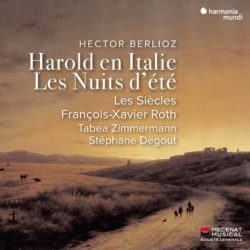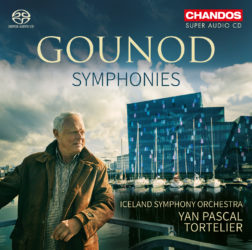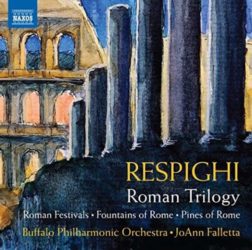Classical CD Reviews: François Xavier-Roth conducts Berlioz, Yan Pascal Tortelier conducts Gounod, and JoAnn Falletta conducts Respighi
By Jonathan Blumhofer
A freshly thought through, energetically executed Berlioz disc; a lovely album that contains excellent performances of underperformed and unfamiliar repertoire that deserves to be heard and championed; a fine, sometimes inspired account of Respighi.

Violist Tabea Zimmermann was a marvelously persuasive protagonist in Colin Davis’s last recording of Hector Berlioz’s Harold in Italy more than a decade ago. How does she fare in François Xavier-Roth’s new traversal of the piece?
To be succinct, just as well. Zimmermann’s Harold is a tempestuous character indeed: brooding nobly in the first-movement introduction, before turning into a hearty extrovert for the music’s main, fast section. Glassy sul ponticello arpeggios are a highlight of the second movement while the third features playing of rustic buoyancy, and the final “Orgie de brigands” is suitably brusque and wild.
The real story in this Harold, though, is Xavier-Roth’s period ensemble Les Siècles, whose gut-strings and valve-less brasses turn in a clean, bracing account of Berlioz’s vigorous symphony-concerto. Indeed, this is as spirited and robust a reading as you might hope to hear: brash, light on its feet, never sounding (or feeling) spare.
Rather, the ensemble plays with plenty of vigor, color, and energy in the outer movements. The middle ones feature a conspicuously taut “Marche de pèlerins” and a jaunty “Sérénade d’un Montagnard.”
A similar sense of drive and spirit marks Les Siècle’s take on Les nuits d’été, Berlioz’s 1841 setting of poems by Théophile Gautier.
In the songs, they’re joined by baritone Stéphane Degout, who sings with warmth and muscularity in the opening “Villanelle,” tender vulnerability in “Sur les lagunes” and “Absences,” and stirring energy in “L’île inconnue.”
In all, then, this is a freshly thought through, energetically executed Berlioz disc, just the thing to mark (if you’re so inclined) the sesquicentennial of the composer’s death. And, if you’d rather just enjoy some fine Berlioz playing and singing, well, this album’s for you, too.

Charles Gounod was an almost frighteningly prolific composer. So, perhaps, it’s little surprise that much of his music has fallen by the wayside. That does, though, makes the Iceland Symphony Orchestra’s (ISO) new recording of his two symphonies with Yan Pascal Tortelier especially welcome.
Both works date from 1855, when Gounod was in his late thirties, and neither suggests a continuation of the sober formal and technical procedures of Beethoven. Quite the opposite, in fact: both symphonies echo Mozart and Haydn to a striking degree. Textural clarity is never wanting. Neither are strong melodic ideas.
Ultimately, these are two light, effervescent works that charm the ear more than they challenge it. And that’s just fine, as Tortelier’s wondrously vibrant readings attest.
The D-major First is a breezy romp. Tortelier, whose tempos are always forward-directed, draws out the graceful counterpoint between woodwinds and violins throughout the lively first movement. He tends thoughtfully to the second’s sometimes-thick textures, while shaping the central fugal episode energetically. The third-movement scherzo (more of a minuet, actually) bounds while the finale is rhythmically taut and brimming with high spirits.
A similar blend of character and warmth mark Tortelier’s and the ISO’s take on the E-flat-major Second Symphony. As a piece, it’s a bit less fresh than the First, but here its textures are cleanly delineated (even the strings’ subtle sextuplet accompanimental figure in the first movement’s introduction speaks clearly) and Gounod’s penchant for effortless lyricism sweeps to the fore.
In all, this is a lovely disc: excellent performances of underperformed and unfamiliar repertoire that deserves to be heard and championed. Maybe the mid-19th-century French symphony wasn’t a hotbed-genre of innovative genius. But between Bizet, Saint-Saëns, and Gounod it sure turned out some fine, lovely, ingratiating stuff. Tortelier and his Icelanders capture the music at its best in performances that are as good (and well-recorded) as they come.

JoAnn Falletta and the Buffalo Philharmonic Orchestra’s (BPO) tackle Ottorino Respighi’s sonic-spectacular “Roman Trilogy” (the tone poems Pini di Roma, Fontane di Roma, and Feste Romane) in a characterful, new recording on the Naxos label.
The BPO plays Feste Romane with plenty of brawn: the brasses are bright and flamboyant in the opening movement while Respighi’s organ writing there comes across mightily, too. Falletta’s account of the second movement shapes the music’s dramatic argument well, while the third is zesty and playful (featuring some nice mandolin, clarinet, and violin solos to boot) and the finale builds to a raucous, jubilant climax.
A similar, glinting energy marks the BPO’s traversal of Pini di Roma. Its first movement is bright and colorful (even if the tempo feels a bit restrained over its first two-thirds). The trumpet solos in the “Catacombs” movement are nicely crepuscular while textures in the lush “Pines of the Gianiculum” are perfectly balanced. The orchestral solos – particularly clarinet, oboe, and cello – in that movement are likewise exquisitely done. If the concluding “Pines of the Appian Way” lacks an epic dimension (and brasses swamp the strings, balance-wise), at least the English horn solo is winningly played and the quintuplet-v.-duple rhythms are tightly etched.
Best of all is Fontini di Roma. The opening movement, with its shimmering colors, is beautifully done. There’s lots of panache in the BPO’s account of the second (“Triton Fountain”), while the ensemble plays up the Straussian bombast of the third (“Trevi Fountain”) without losing sight of the music’s dramatic trajectory. In the finale, with its delicate harp and chimes gestures, plaintive woodwind solos, and the like, is gorgeous; the coda sings luminously.
Bottom line: this is a fine, sometimes inspired account of these pieces. Riccardo Muti’s recording with the Philadelphia Orchestra and Leonard Bernstein’s with the New York Philharmonic offer a bit more consistency in terms of character and technical brilliance, but Falletta and her Buffalo musicians do themselves proud here.
Jonathan Blumhofer is a composer and violist who has been active in the greater Boston area since 2004. His music has received numerous awards and been performed by various ensembles, including the American Composers Orchestra, Kiev Philharmonic, Camerata Chicago, Xanthos Ensemble, and Juventas New Music Group. Since receiving his doctorate from Boston University in 2010, Jon has taught at Clark University, Worcester Polytechnic Institute, and online for the University of Phoenix, in addition to writing music criticism for the Worcester Telegram & Gazette.
